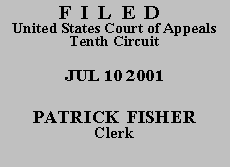

| RALPH E. PLOTNER, JR.,
an individual,
Plaintiff-Appellant, v. UNITED STATES OF AMERICA, by and through Louis J. Freeh, Director of the Federal Bureau of Investigation; ROBERT F. WEBB, individually; ROBERT F. WEBB, an employee and representative of the Federal Bureau of Investigation, a United States Agency, Defendants-Appellees. |
|
Plaintiff Ralph E. Plotner, Jr. brought this action based on his allegation that false testimony by Federal Bureau of Investigation agent Robert Webb at his 1984 criminal trial led to his convictions on several charges. He contends that Webb and the FBI, which allegedly ratified and condoned the testimony, thereby intentionally and negligently violated his constitutional rights, and he seeks relief pursuant to Bivens(1) and the Federal Tort Claims Act. On defendants' motion to dismiss pursuant to Fed. R. Civ. P. 12(b)(6), the district court determined that sovereign immunity barred Plotner's claims against the government and against Webb in his official capacity. It also found that Plotner's claims against Webb in his individual capacity necessarily challenged the validity of his criminal convictions, and that these claims were barred by Heck v. Humphrey, 512 U.S. 477, 486-87 (1994), because the convictions had not been invalidated. Alternatively, it held that the claims against Webb failed on the basis of absolute immunity for testifying witnesses. See Miller v. Glanz, 948 F.2d 1562, 1570-71 (10th Cir. 1991). The court therefore granted defendants' motion and dismissed the case.
On appeal, Plotner challenges the district court's determinations that Heck barred his claims against Webb and that Webb was entitled to absolute immunity. We review de novo a dismissal pursuant to Rule 12(b)(6), accepting all well-pleaded facts as true and viewing them in the light most favorable to the nonmoving party. Sutton v. Utah State Sch. for the Deaf & Blind, 173 F.3d 1226, 1236 (10th Cir. 1999). We have fully considered Plotner's arguments and reviewed the record, and conclude the district court did not err in dismissing the case for failure to state a claim. Therefore, for substantially the same reasons as stated in the district court's November 20, 2000 order, we AFFIRM the judgment of the district court.
Entered for the Court
Circuit Judge
*. This order and judgment is not binding precedent, except under the doctrines of law of the case, res judicata, and collateral estoppel. The court generally disfavors the citation of orders and judgments; nevertheless, an order and judgment may be cited under the terms and conditions of 10th Cir. R. 36.3.
1. Bivens v. Six Unknown Named Agents of Federal Bureau of Narcotics, 403 U.S. 388 (1971).